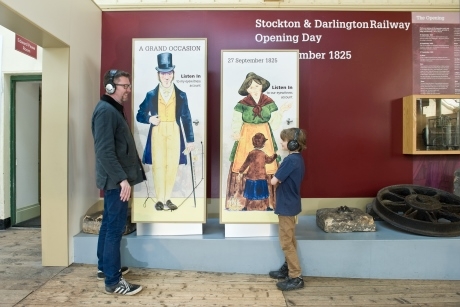
School Travel Organiser explores the different workshops on offer for Key Stages 1, 2 and 3 at Head of Steam – Darlington Railway Museum.
Head of Steam – formally known as the Darlington Railway Centre and Museum – is a railway museum located on the 1825 route of the Stockton and Darlington Railway, which is thought to have been the world’s first steam-powered passenger railway.
Opened in 1825, the railway was launched with the prime purpose of transporting coal from the South West Durham collieries around Shildon, West Aukland and Witton Park.
Today, the museum has four locomotives on display, on loan from the National Railway Museum, and holds a large model of the Stockton and Darlington Railway.
The museum also offers a wide range of learning opportunities.
Visiting the museum
A typical visit to the museum can last between one and four hours and follows a simple itinerary.
10am – Schools arrive at the museum, listen to health and safety information and are given an introduction to the activities.
10:10am – Students participate in an object handling session.
11:10am – The museum will be explored with the use of trail sheets.
12:00pm – Lunchtime at either one of the museums indoor or outdoor spaces.
12:40pm – Schools take part in creative writing activities about the opening day of Stockton and Darlington Railway.
1:40pm – Children will have the chance to ask any questions, share the facts that they have learned and get ready to leave at 2pm.
Workshops
There are plenty of workshops to choose from which schools can take part in during their visit to the museum.
One example is The Opening Day of the Stockton and Darlington Railway workshop.
This workshop has links to Local History, Art, English – speaking and listening, Writing, Drama and roleplay. Pupils will look at a painting by John Dobbin and discuss how the people in that painting would have felt and the conversations they would have.
Making a Mark
The museum has also received government funding via Arts Council England to offer a programme for schools called Making a Mark, supported by the National Portrait Gallery.
Schools can take part in the project for free over a course of three sessions at the museum.
The Tell Tales activity, as part of the Making a Mark programme, allows schools to explore the museum and its collections, look at images of people and places, including images of authors from the National Portrait Gallery collections, and take part in roleplay and story planning.
National curriculum links include History and Literacy.
For more information visit www.darlington.gov.uk or contact learning and access officer Sarah Gouldsbrough at sarah.gouldsbrough@darlington.gov.uk.










